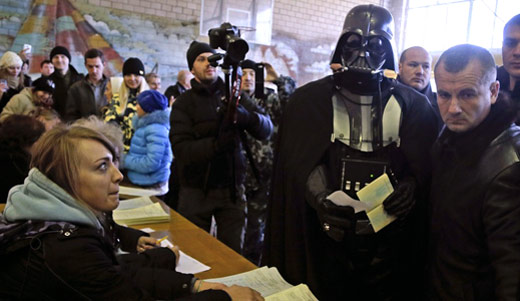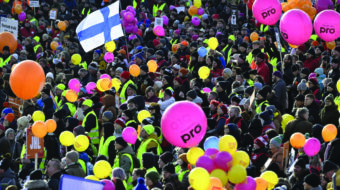
I lived in Chicago, Illinois for 35 years and was active in that city’s politics for the whole time. I saw some pretty strange electoral practices, but nothing to compare with the legislative “elections” that happened on Sunday, October 26, in Ukraine.
The official results are not to be announced until this week some time. Ukraine also has a complicated system of legislative elections whereby some legislators are elected from single member constituencies and others from party lists. So we have only an approximate idea of what the new Rada, as the legislature is called, will look like.
It would appear, based on exit polls, that the political parties headed by President Petro Poroshenko (the “Poroshenko Bloc”) and caretaker Prime Minister Arseny Yatsenyuk (the So-called “People’s Front”) got the largest share of the vote, estimated at 21.52 percent and 21.94 percent respectively. Third in line was the church-oriented Self Reliance Party with 11.09 percent. The Fatherland Party of former Prime Minister Yulia Timoshenko is greatly reduced, down to 5.67 percent. Former President Yanukovych’s Party of the Regions, which won the most seats in 2012, is gone, to some extent being replaced by a small loosely organized “Opposition” grouping (9.61 percent). The far-right Svoboda may or may not have received enough votes to enter the legislature. The Communist Party of Ukraine, which had 32 seats after the 2012 elections, is now completely absent from the chamber. The fascist Right Sektor also did not meet the five percent threshold for seats in the Rada.
Why did the Communist Party of the Ukraine, which in the last elections won 32 seats with 13.18 percent of the overall popular vote suddenly disappear from the parliament entirely?
First of all the Crimean Peninsula seceded from Ukraine and was annexed by Russia. Crimea had been a major Communist Party stronghold.
Secondly, the Communists were also strong in Eastern Ukraine, particularly in Donetsk and Luhansk provinces, where the Russian speaking population predominates. But both of these provinces, have effectively separated from Ukraine, and decided not to participate in the October 26 poll, choosing instead to run their own elections on November 2. So turnout for the Sunday election was extremely low in the East.
But repression also played a role. Sectors of the ultra-right with fascist and Nazi origins were allowed to run riot by the “respectable” conservatives who took over the Ukrainian government in February. Two groups coming out of the far west of the country, Svoboda (“Freedom” and Pravy Sektor (“Right Sector”) have been on the rampage all year, not confining themselves to knocking down statues of Lenin but also to physically attacking communists and others that they consider “unpatriotic.” Their heroes are Stepan Bandera and Roman Shukhevich, known for their collaboration with Hitler’s Germany during World War II. Although the subservient corporate press in Europe and the United States tries to play down the fascist roots of these groups as mere “Russian propaganda,” they have shown their fascist roots in word and deed, over and over again. It was these groups that, by armed action, destroyed a compromise settlement that had been worked out between Ukrainian political factions and the European Union that might have avoided the thousands of deaths that have occurred since the protests in Kiev took a violent turn in February.
Odessa on the Black Sea had also been a stronghold of the Communist Party. On May 2, fascist elements trapped numbers of opponents of the Kiev regime in the Trade Union House in that historic city, and burned or beat them to death. A number of communists lost their lives.
The Communist Party’s legally elected deputies were thrown out of the Rada through a tricky legal maneuver in July. The party is being prosecuted for unpatriotic behavior, and there is a threat that party members will be stripped of government positions in the famous “lustration” process now being advocated.
As a result of these things and of the shelling and bombing of civilians in Donetsk and Luhansk, tens of thousands of refugees have streamed eastward from Ukraine to Rostov-on-Don Province in Russia and points east. Whether they might return, is at this point just a matter of conjecture.
In spite of these multiple obstacles to a fair election, the U.S. State Department hailed the process as free and fair.
So the parties that officially support the integration of Ukraine into the European Union are now in full control. Already the corporate vultures are circulating. Workers in Ukraine will now feel the full brunt of the policies of austerity, deregulation, union busting and privatization that have been imposed by the Troika (International Monetary Fund, European Central Bank and European Commission) on the poor countries of Europe, leading to years of mass protests.
And then there’s the matter of NATO.
Photo: Darth Vader, previously known as Viktor Shevchenko, the leader of the Ukrainian Internet Party, waits to receive his ballot papers at polling station during parliamentary elections in Kiev Oct. 26. Efrem Lukatsky/Associated Press












Comments